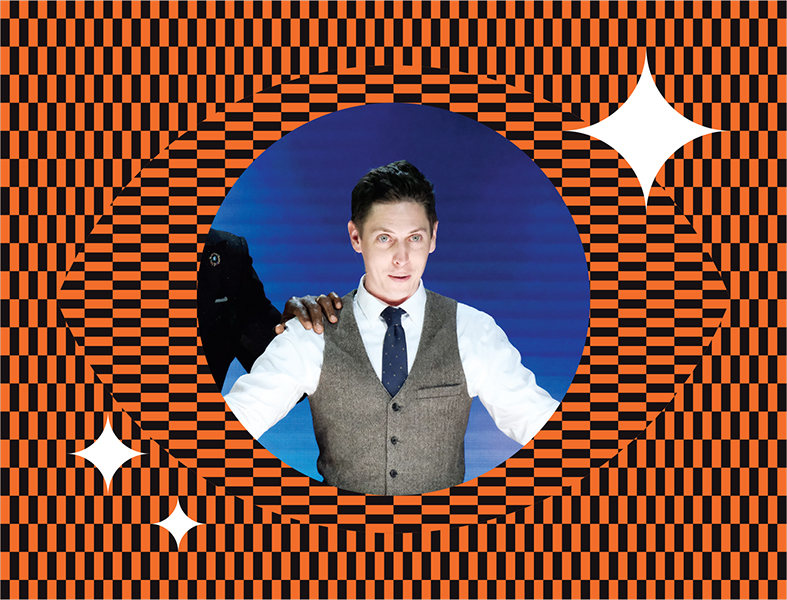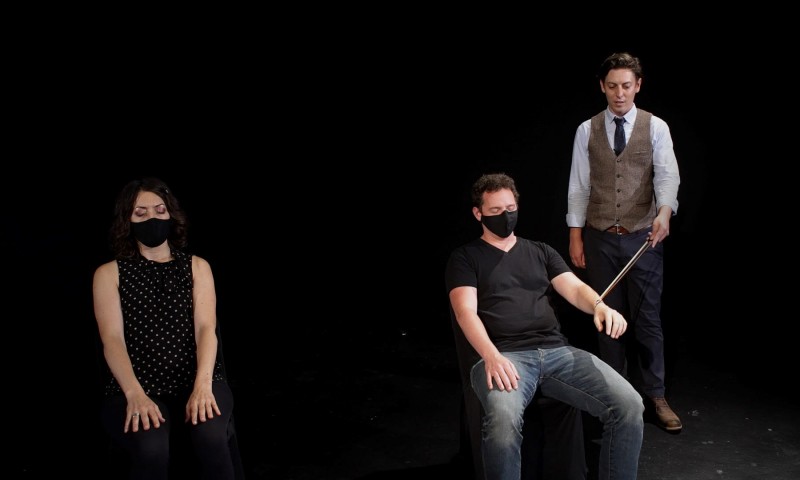Meet Nicholas Wallace, the award-winning magician and co-creator with Marco Cera of Music & Magic, our mesmerizing new digital program for all ages.
A master of subtle illusion and manipulation, Nicholas has appeared on season 14 of America's Got Talent, Penn and Teller: Fool Us, as well as FOXtv's Houdini & Doyle's World of Wonders. He has been named the Canadian Champion of Magic by the Canadian Association of Magicians and is the 2018 recipient of the Allan Slaight Award for Canadian Rising Star.
Nicholas can best be described as a minimalist who has forgone fancy props and special effects, preferring to conjure an audience’s imagination by presenting magic and mind-reading in a way that is both entertaining and thought provoking.
We recently caught up with Nicholas to chat about the art and craft of magic and his collaboration with Tafelmusik.
Nicholas Wallace
What first attracted you to magic?
Nicholas Wallace: I wish I had a good answer. I've been asked so many times, I should have a good answer! It's just one of those weird things. I got hooked on magic when I was young. And funnily enough, I played violin for almost 14 years when I was younger. I was never terribly good at violin because when I was supposed to be practicing music, I was secretly practicing magic. And magic is what won out. So in some ways, working on this project with Tafelmusik feels like a long time coming. It feels like I've totally come full circle.
How did you get involved with Tafelmusik on this project?
NW: I have a friend of a friend who knows someone at Tafelmusik. He mentioned that Marco Cera and Tafelmusik had been thinking about a magic and music project and wanted to know if I was interested. That was more than a year ago. The world had shut down, and I wasn't performing, so it was the perfect time to jump into pre-production. Marco had been floating the idea for a couple years, but didn't have the magic component figured out. So we started working on it, and Tafelmusik got more and more excited about it. Initially it was just supposed to be a short project, but it ended up being part of the main season.
Did working with the musicians bring back any childhood memories?
NW: I was sort of pressured to play violin as a child. And I’ll admit, I am still relieved that I don’t have to go to orchestra practise on Saturday mornings! But the one thing I do miss is that feeling of sitting in an orchestra and being part of that wave of sound. It's a very cool feeling.
Is this your first time working with a musical ensemble? If yes, how did you approach this from a magician’s perspective?
NW: This is my first time combining the performance of magic with a live ensemble, but I always get excited about searching for the perfect piece of music to accompany a piece of magic, or crafting a routine to fit a specific piece of music, so it wasn’t too much of a stretch. Magic is usually a solitary venture, so I’m always excited when I have a chance to collaborate. This whole project from beginning to end has been a massive collaboration.
Nicholas Wallace leads Tafelmusik Elisa Citterio (left) and Keiran Campbell (right) through a trick, in Music & Magic
How do you distinguish between magic intended for adults and magic geared towards children?
NW: I think it is a misconception that magic is meant for children. Performing magic for young children is really challenging and sometimes doesn’t work at all. You have to know enough about how the world works in order to realize that something should not be possible. If I make a coin disappear for a three- year-old, they will think it’s amazing, but no more amazing than watching popcorn pop, or bubbles float. When you are a kid, everything is magical. Maybe that’s why some adults make that association. Magic makes them feel like a kid again.
Why have online magic shows become so popular during the pandemic?
NW: The pandemic has shaken confidence in our fundamental assumptions about how daily life is supposed to unfold. A magic show is a safe place to play with those assumptions. It’s a tacit agreement that an audience and a magician make: you know this isn’t real, and I know this isn’t real, but let’s just play for the next 30 minutes — unlike in the real world, where it’s not a good feeling to have your assumptions rocked.
At the start of the pandemic, I was quite hesitant because I thought, people are just really hungry for entertainment. Well now you’re competing with Netflix, Game of Thrones, Steven Spielberg. I wondered, why wouldn’t people just watch YouTube if they wanted to see magic? But it’s the fact that magic breaks that fourth wall, even if you’re doing it digitally.
Anything the audience should keep in mind as they watch Music & Magic?
NW: I would like the audience to know that the moments they witness during the show are authentic and untampered. The music has been rehearsed, however individual musicians were seeing the magic for the first time during the recording session and audiences will be seeing their genuine surprise and wonder. Nothing has been set up or pre-arranged, and there’s been no editing or camera trickery. It’s important to remember that the tricks of the conjurer and tools of composer are connected in many strange ways!
The show references the 18th-century English conjurer Isaac Fawkes. Were you familiar with him before working on the project?
NW: I was only vaguely familiar with Isaac Fawkes and knew very little about him. Marco was the one who became fascinated with him and his connection to the same performance venues as Handel. I did learn that he was one of the first magicians to move his performances from the streets into the concert halls. He made it a bit more of a respectable art form.
What past or current magicians inspire you?
NW: There are too many to name. Penn & Teller have been a huge influence. They always assume their audience is smarter than them, and for a profession that involves so much cheating and deception, are surprisingly honest in their performances. It’s also amazing to see them still constantly working on new material after 40-plus years together.
I will also mention Derek DelGaudio. I think/hope what he does is the future of magic. Magic can often feel like you are showing off. Derek DelGuadio has found a way to put ego aside. He presents magic in a very open, honest way that doesn't feel like he is trying to display any skill or convince us of anything. It's hard to explain. His wonderful off-Broadway show was recently turned into a film called In & Of Itself. I cannot recommend it enough.
Can you give us an example of the parallels between music and magic?
NW: There's a style of card magic called “jazz magic” and it's very similar to jazz music: you know how you’re starting, you know how you’re ending, you know certain beats in the middle, but the routine is very much improvised depending on the audience reactions. It's terrifying, actually!
Both musicians and magicians have their tools, their elements to create their art: harmony and rhythm for the composers, sleight of hand and misdirection for the magicians. But in both of these art forms, the end goal is not to deceive. It is to delight—to spark our imaginations.
Music & Magic premieres online on October 28, 2021 at 8pm EDT. Learn more at tafelmusik.org/music-and-magic


